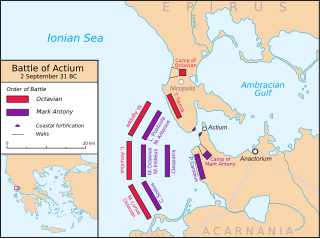Related Research Articles
The Julian calendar is a solar calendar of 365 days in every year with an additional leap day every fourth year. The Julian calendar is still used as a religious calendar in parts of the Eastern Orthodox Church and in parts of Oriental Orthodoxy as well as by the Amazigh people.

Year 31 BC was either a common year starting on Tuesday, Wednesday or Thursday or a leap year starting on Tuesday or Wednesday of the Julian calendar and a common year starting on Tuesday of the Proleptic Julian calendar. At the time, it was known as the Year of the Consulship of Antonius and Caesar or as Caesar and Messalla. The denomination 31 BC for this year has been used since the early medieval period, when the Anno Domini calendar era became the prevalent method in Europe for naming years.

Year 27 BC was either a common year starting on Sunday, Monday or Tuesday or a leap year starting on Monday of the Julian calendar and a common year starting on Sunday of the Proleptic Julian calendar. At the time, it was known as the Year of the Second Consulship of Octavian and Agrippa. The denomination 27 BC for this year has been used since the early medieval period, when the Anno Domini calendar era became the prevalent method in Europe for naming years.
Year 43 BC was either a common year starting on Sunday, Monday or Tuesday or a leap year starting on Sunday or Monday of the Julian calendar and a common year starting on Monday of the Proleptic Julian calendar. At the time, it was known as the Year of the Consulship of Pansa and Hirtius. The denomination 43 BC for this year has been used since the early medieval period, when the Anno Domini calendar era became the prevalent method in Europe for naming years.
AD 4 was a common year starting on Wednesday or a leap year starting on Tuesday of the Julian calendar and a leap year starting on Tuesday of the Proleptic Julian calendar. In the Roman Empire, it was known as the Year of the Consulship of Catus and Saturninus. The denomination "AD 4" for this year has been used since the early medieval period, when the Anno Domini calendar era became the prevalent method in Europe for naming years.
Year 14 BC was either a common year starting on Thursday or Friday or a leap year starting on Wednesday, Thursday or Friday of the Julian calendar and a common year starting on Tuesday of the Proleptic Julian calendar. At the time, it was known as the Year of the Consulship of Crassus and Lentulus. The denomination 14 BC for this year has been used since the early medieval period, when the Anno Domini calendar era became the prevalent method in Europe for naming years.

Year 44 BC was either a common year starting on Sunday, common year starting on Monday, leap year starting on Friday, or leap year starting on Saturday. and a common year starting on Sunday of the Proleptic Julian calendar. At the time, it was known as the Year of the Consulship of Julius Caesar V and Marc Antony. The denomination 44 BC for this year has been used since the early medieval period, when the Anno Domini calendar era became the prevalent method in Europe for naming years.
This article concerns the period 29 BC – 20 BC.
5 BC was a common year starting on Monday or Tuesday of the Julian calendar and a leap year starting on Saturday of the Proleptic Julian calendar. In the Roman world, it was known as the Year of the Consulship of Augustus and Sulla. The denomination 5 BC for this year has been used since the early medieval period, when the Anno Domini calendar era became the prevalent method in Europe for naming years.
Year 38 BC was either a common year starting on Sunday or Monday or a leap year starting on Saturday, Sunday or Monday of the Julian calendar and a common year starting on Sunday of the Proleptic Julian calendar. At the time, it was known as the Year of the Consulship of Pulcher and Flaccus. The denomination 38 BC for this year has been used since the early medieval period, when the Anno Domini calendar era became the prevalent method in Europe for naming years. It was also the first year of the Spanish era calendar in use in Hispania until the 15th century.
Year 37 BC was either a common year starting on Monday, Tuesday or Wednesday or a leap year starting on Monday or Tuesday of the Julian calendar and a leap year starting on Monday of the Proleptic Julian calendar. At the time, it was known as the Year of the Consulship of Agrippa and Gallus. The denomination 37 BC for this year has been used since the early medieval period, when the Anno Domini calendar era became the prevalent method in Europe for naming years.
Year 41 BC was either a common year starting on Wednesday or Thursday or a leap year starting on Tuesday, Wednesday or Thursday of the Julian calendar and a leap year starting on Wednesday of the Proleptic Julian calendar. At the time, it was known as the Year of the Consulship of Antonius and Vatia. The denomination 41 BC for this year has been used since the early medieval period, when the Anno Domini calendar era became the prevalent method in Europe for naming years.
Year 30 BC was either a common year starting on Wednesday, Thursday or Friday or a leap year starting on Thursday of the Julian calendar and a common year starting on Wednesday of the Proleptic Julian calendar. At the time, it was known as the Year of the Consulship of Octavian and Crassus. The denomination 30 BC for this year has been used since the early medieval period, when the Anno Domini calendar era became the prevalent method in Europe for naming years.
Year 28 BC was either a common year starting on Saturday, Sunday or Monday or a leap year starting on Saturday or Sunday of the Julian calendar and a common year starting on Saturday of the Proleptic Julian calendar. At the time, it was known as the Year of the First Consulship of Octavian and Agrippa. The denomination 28 BC for this year has been used since the early medieval period, when the Anno Domini calendar era became the prevalent method in Europe for naming years.
Year 25 BC was either a common year starting on Wednesday, Thursday or Friday or a leap year starting on Wednesday or Thursday of the Julian calendar and a leap year starting on Tuesday of the Proleptic Julian calendar. At the time, it was known as the Year of the Consulship of Augustus and Silanus. The denomination 25 BC for this year has been used since the early medieval period, when the Anno Domini calendar era became the prevalent method in Europe for naming years.
Year 20 BC was either a common year starting on Wednesday or Thursday or a leap year starting on Tuesday, Wednesday or Thursday of the Julian calendar and a common year starting on Tuesday of the Proleptic Julian calendar. At the time, it was also known as the Year of the Consulship of Appuleius and Nerva. The denomination 20 BC for this year has been used since the early medieval period, when the Anno Domini calendar era became the prevalent method in Europe for naming years.
Year 21 BC was either a common year starting on Monday, Tuesday or Wednesday or a leap year starting on Tuesday of the Julian calendar and a leap year starting on Sunday of the Proleptic Julian calendar. At the time, it was known as the Year of the Consulship of Lollius and Lepidus. The denomination 21 BC for this year has been used since the early medieval period, when the Anno Domini calendar era became the prevalent method in Europe for naming years.

Year 16 BC was either a common year starting on Monday, Tuesday or Wednesday or a leap year starting on Monday or Tuesday of the Julian calendar and a common year starting on Sunday of the Proleptic Julian calendar. At the time, it was known as the Year of the Consulship of Ahenobarbus and Scipio. The denomination 16 BC for this year has been used since the early medieval period, when the Anno Domini calendar era became the prevalent method in Europe for naming years.
Year 22 BC was either a common year starting on Sunday, Monday or Tuesday or a leap year starting on Sunday or Saturday of the Julian calendar and a common year starting on Saturday of the Proleptic Julian calendar. At the time, it was known as the Year of the Consulship of Marcellus and Arruntius. The denomination 22 BC for this year has been used since the early medieval period, when the Anno Domini calendar era became the prevalent method in Europe for naming years.
Year 15 BC was either a common year starting on Tuesday, Wednesday or Thursday or a leap year starting on Wednesday of the Julian calendar and a common year starting on Monday of the Proleptic Julian calendar. At the time, it was known as the Year of the Consulship of Drusus and Piso. The denomination 15 BC for this year has been used since the early medieval period, when the Anno Domini calendar era became the prevalent method in Europe for naming years.